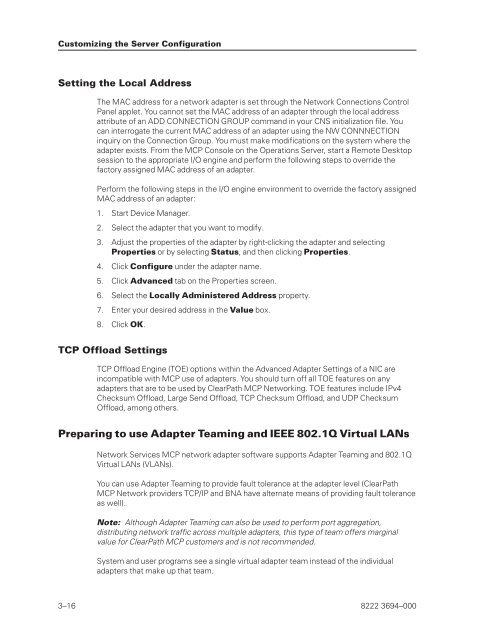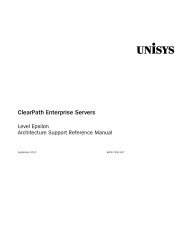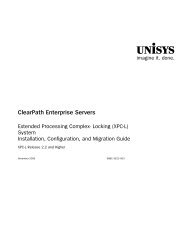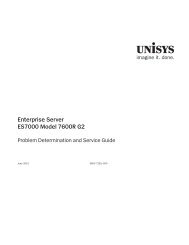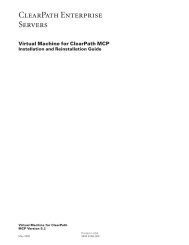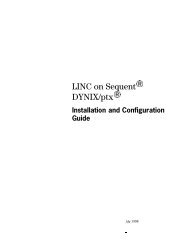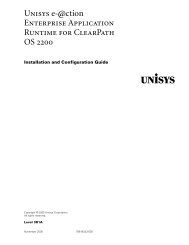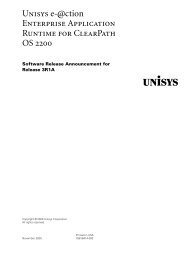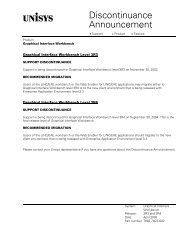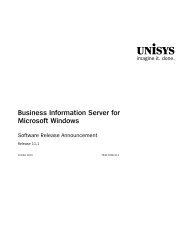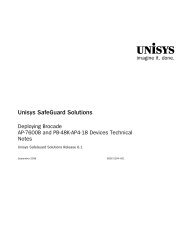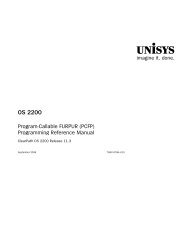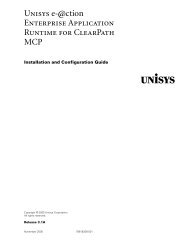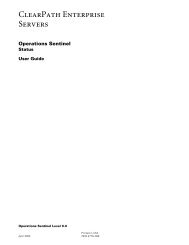FS6200 Server System Implementation Guide - Public Support ...
FS6200 Server System Implementation Guide - Public Support ...
FS6200 Server System Implementation Guide - Public Support ...
You also want an ePaper? Increase the reach of your titles
YUMPU automatically turns print PDFs into web optimized ePapers that Google loves.
Customizing the <strong>Server</strong> Configuration<br />
Setting the Local Address<br />
The MAC address for a network adapter is set through the Network Connections Control<br />
Panel applet. You cannot set the MAC address of an adapter through the local address<br />
attribute of an ADD CONNECTION GROUP command in your CNS initialization file. You<br />
can interrogate the current MAC address of an adapter using the NW CONNNECTION<br />
inquiry on the Connection Group. You must make modifications on the system where the<br />
adapter exists. From the MCP Console on the Operations <strong>Server</strong>, start a Remote Desktop<br />
session to the appropriate I/O engine and perform the following steps to override the<br />
factory assigned MAC address of an adapter.<br />
Perform the following steps in the I/O engine environment to override the factory assigned<br />
MAC address of an adapter:<br />
1. Start Device Manager.<br />
2. Select the adapter that you want to modify.<br />
3. Adjust the properties of the adapter by right-clicking the adapter and selecting<br />
Properties or by selecting Status, and then clicking Properties.<br />
4. Click Configure under the adapter name.<br />
5. Click Advanced tab on the Properties screen.<br />
6. Select the Locally Administered Address property.<br />
7. Enter your desired address in the Value box.<br />
8. Click OK.<br />
TCP Offload Settings<br />
TCP Offload Engine (TOE) options within the Advanced Adapter Settings of a NIC are<br />
incompatible with MCP use of adapters. You should turn off all TOE features on any<br />
adapters that are to be used by ClearPath MCP Networking. TOE features include IPv4<br />
Checksum Offload, Large Send Offload, TCP Checksum Offload, and UDP Checksum<br />
Offload, among others.<br />
Preparing to use Adapter Teaming and IEEE 802.1Q Virtual LANs<br />
Network Services MCP network adapter software supports Adapter Teaming and 802.1Q<br />
Virtual LANs (VLANs).<br />
You can use Adapter Teaming to provide fault tolerance at the adapter level (ClearPath<br />
MCP Network providers TCP/IP and BNA have alternate means of providing fault tolerance<br />
as well).<br />
Note: Although Adapter Teaming can also be used to perform port aggregation,<br />
distributing network traffic across multiple adapters, this type of team offers marginal<br />
value for ClearPath MCP customers and is not recommended.<br />
<strong>System</strong> and user programs see a single virtual adapter team instead of the individual<br />
adapters that make up that team.<br />
3–16 8222 3694–000


